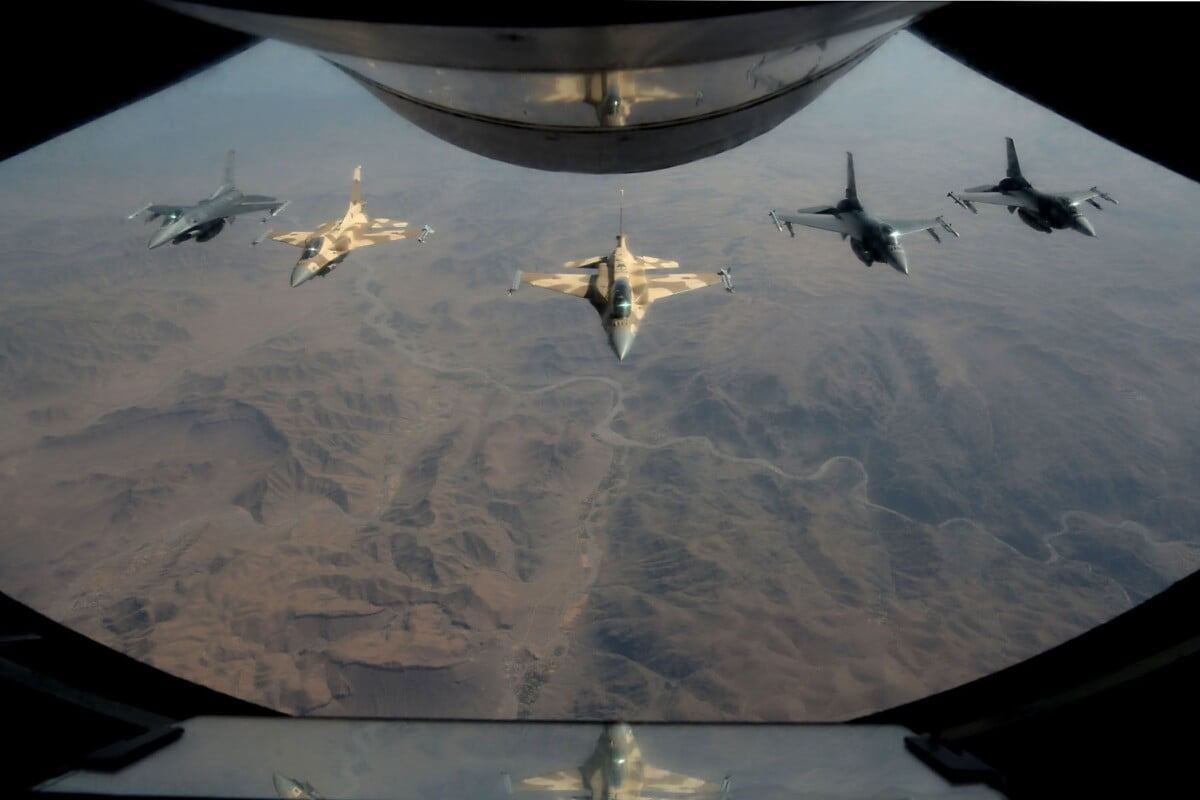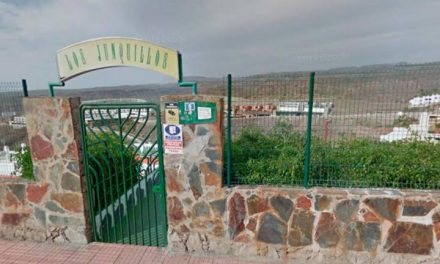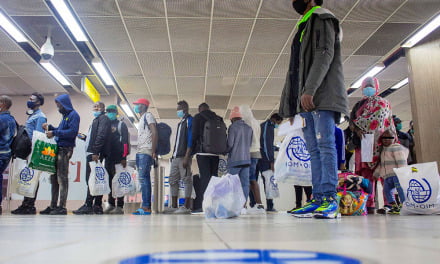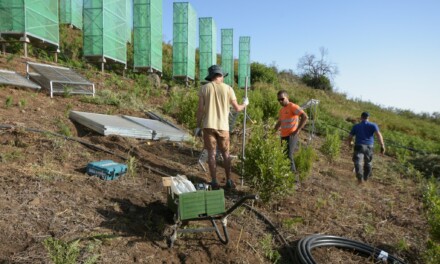Military manoeuvres will take place in June both on land in Western Sahara and close to the waters of Canary Islands in a joint US and Moroccan exercise, along with several other countries but not including Spain. This has been billed as the “largest exercise in Africa” with an overwhelming deployment of resources planned for Operation African Lion scheduled from June 7 to 18. The main peculiarity is that the Western Saharan town of Mahbes, near the border with Algeria beside the Tindouf Sahrawi refugee camps, will be the scene of some of the biggest deployments as well as in Dakhla (Villacisneros) in the south of the Sahrawi territory, as well as Tan Tan, in the south of Morocco, one of the closest points to the Canary Islands.
The two countries have been preparing for several months, but the manoeuvres are being seen as provocative, by some, due to the current difficulties in relations between Spain and Morocco. Thousands of Moroccan migrants have tried to reach Europe irregularly over the last year, often without any resistance from the Moroccan authorities, with the most recent surge last week having occurred in the Spanish Autonomous enclave of Ceuta. It happened, according to reports on the ground, following a sudden opening of the Moroccan side of the border, ostensibly seen as some type of response to political outrage within the Alawite government, supposedly because Spain had allowed the leader of the Sahwari Democratic Republic’s Polisario Front, Brahim Gali, to come to the country for medical assistance. The 2021 African Lion exercises, it is feared, will further embolden the regime, led by King Mohamed VI, with a display of military might, carried out actually within Western Sahara, a former Spanish colony, with the unequivocal backing of the United States.
At the end of last year the outgoing US president, controversially recognised Rabat’s so-called sovereignty, in a dismissal of UN policy, over the disputed territory of Western Sahara, which Morocco has occupied since Spain left in 1975. At the heart of this recognition was the US brokered Israel–Morocco normalisation agreement, announced in December 2020, through which Morocco has re-established full diplomatic relations and trade relations with Israel, resuming official diplomatic contacts and direct flights between the two countries. In exchange for the deal, the United States agreed to recognise Morocco’s claim over the occupied territory, while urging the parties involved to “negotiate a mutually acceptable solution”, but using Morocco’s autonomy plan as the only framework, thereby seeming to exclude the Sahrawi Arab Democratic Republic’s demands for self-determination. A more than 39-year ceasefire was declared broken on November 13 2020 following a Moroccan military operation to remove Sahrawi protesters, demonstrating on an illegally built road, it just so happens on the same day that a high ranking US general was in Rabat to discuss plans for African Lion and other exercises this year.
 June’s exercises will be the largest deployment in Africa for such an exercise. Led by Africom, the United State’s Africa Command, African Lion will include nearly 8,000 troops from up to nine countries; 21 military and 46 other support aircraft; more than 100 armoured vehicles; two ships; and a budget $24 million with 21 countries attending as observers. Spain is not participating on this occasion either on the ground nor as an observer, a decision that Spain’s Ministry of Defence took several months ago without reference of the currently cold relations with Rabat. US General James C. McConville, Chief of Staff for the United States Army, has however highlighted the strategic importance of these manoeuvres through social networks.
June’s exercises will be the largest deployment in Africa for such an exercise. Led by Africom, the United State’s Africa Command, African Lion will include nearly 8,000 troops from up to nine countries; 21 military and 46 other support aircraft; more than 100 armoured vehicles; two ships; and a budget $24 million with 21 countries attending as observers. Spain is not participating on this occasion either on the ground nor as an observer, a decision that Spain’s Ministry of Defence took several months ago without reference of the currently cold relations with Rabat. US General James C. McConville, Chief of Staff for the United States Army, has however highlighted the strategic importance of these manoeuvres through social networks.
 The exercises on the ground and at sea will come only three months after naval and air manoeuvres carried out between the US and our neighbouring Maghrebi kingdom surprised both Spain and the regional government after the deployment to the north of the Canary Islands without notification or warning. Air controllers on the Islands were “surprised by the flight of North American military planes over Spanish airspace”, the aircraft carrier USS Dwight D. Eisenhower crossed the ocean north of the island of La Palma and there is evidence that several fighters invaded Spanish airspace repeatedly. All this happened in the first fortnight of March without prior notice, as is stated in the official response of the Canarian Government to a question in Parliament.
The exercises on the ground and at sea will come only three months after naval and air manoeuvres carried out between the US and our neighbouring Maghrebi kingdom surprised both Spain and the regional government after the deployment to the north of the Canary Islands without notification or warning. Air controllers on the Islands were “surprised by the flight of North American military planes over Spanish airspace”, the aircraft carrier USS Dwight D. Eisenhower crossed the ocean north of the island of La Palma and there is evidence that several fighters invaded Spanish airspace repeatedly. All this happened in the first fortnight of March without prior notice, as is stated in the official response of the Canarian Government to a question in Parliament.
 Morocco, it is feared, is currently focused on various expansionist projects, including an estimated $22 billion increase in military spending, having rivalled both Saudi Arabia and Algeria in recent years in the acquisition of new weaponry, as well as trying to consolidate their disputed claim over the Western Sahara, as they attempt to solidify supply lines to West Africa and other sub-saharan countries, in anticipation of a planned gas pipeline that is set to supply the country and Europe within the next decade. There will be a lot more to learn over the coming months and years, and for The Canary Islands there are deep concerns about regional relations and the projection of military power from our nearest neighbours, and just what their future aspirations might be in the region. African Lion will gift Morocco a show of geo-strategic strength, alongside their US partners, which will in turn have repercussions across the region and send a message to the world about their hopes and presumed status as a primary North African military power on the doorstep of Europe.
Morocco, it is feared, is currently focused on various expansionist projects, including an estimated $22 billion increase in military spending, having rivalled both Saudi Arabia and Algeria in recent years in the acquisition of new weaponry, as well as trying to consolidate their disputed claim over the Western Sahara, as they attempt to solidify supply lines to West Africa and other sub-saharan countries, in anticipation of a planned gas pipeline that is set to supply the country and Europe within the next decade. There will be a lot more to learn over the coming months and years, and for The Canary Islands there are deep concerns about regional relations and the projection of military power from our nearest neighbours, and just what their future aspirations might be in the region. African Lion will gift Morocco a show of geo-strategic strength, alongside their US partners, which will in turn have repercussions across the region and send a message to the world about their hopes and presumed status as a primary North African military power on the doorstep of Europe.












